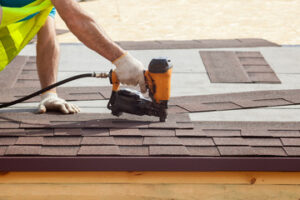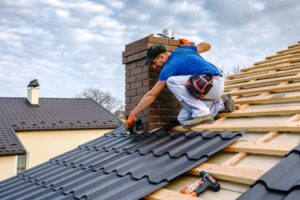Roofing companies specialize in roofs and offer a wide range of services. They can handle insurance claims, roof repairs, and even inspections for real estate companies.

They may also be members of group buying organizations, which helps them cut costs by purchasing materials in bulk. This saves them the time and money of shopping around for the best deals.
Roofing contractors can boost their business prospects by building strategic partnerships with key stakeholders, including residential developers and building-services management companies. Developing these relationships can help them generate repeat business and provide a steady flow of new construction projects. Additionally, fostering strong relationships with industry suppliers can also provide access to high-quality roofing materials at competitive prices. Moreover, establishing a robust social media presence can help roofing businesses establish brand awareness and increase their visibility among prospective customers.
When looking for a roofing company, it is important to choose one with a local office and experience in the area. In addition, a good roofing company should have proper licensing and insurance coverage. They should also offer transparent pricing, which will allow homeowners to compare quotes easily. Lastly, they should be willing to answer questions and concerns.
Aside from offering a full range of roofing services, roofing companies can provide a wide variety of other home improvement and renovation products. These include gutters, siding, windows, and roof insulation. In addition, roofing companies can also install solar energy systems and improve the home’s curb appeal by replacing outdated fixtures.
Local roofing companies have in-depth knowledge of the local climate, weather patterns, and environmental challenges. This insight enables them to recommend the right roofing materials and construction methods for your region. For example, areas prone to high winds require specific roofing solutions. Similarly, areas with heavy snowfall require different roof construction techniques.
Choosing a business name for your roofing company is an important step in the startup process. A good name should be easy to spell and pronounce, and it should be memorable. It should also reflect the type of work that the roofing company does. Additionally, the name should be spelled correctly to ensure that homeowners can find it on Google and other search engines.
When launching a roofing business, it is crucial to make a financial plan that will guide your operations until you break even or start turning a profit. You should also set aside enough money to meet your financial needs during this period. In addition, you should consider setting a long-term goal to give yourself something to aim for and a yardstick to measure your success against.
Personalized Service
Roofing companies provide personalized service, including roof inspections, estimates and project management. They can also help homeowners choose the best materials for their needs, and they often have access to a variety of roofing options that might not be available at local home improvement stores. Roofing businesses can also offer warranties on their work, which can provide peace of mind for homeowners who are concerned about a potential problem down the line.
Whether you are a current homeowner who has been thinking about making some changes to your roof, or you are considering starting your own roofing company, gaining the right knowledge can make all the difference. Taking the time to do your research can ensure that you are well-equipped to meet the demands of a growing roofing industry, and that your business is financially sound. During your initial research, you should consider not only direct costs such as equipment and materials, but also soft costs like operational expenses and marketing.
The first step in launching a successful roofing business is creating a solid plan that outlines both short- and long-term goals. You should then consult with a good accountant, possibly one who is a friend or a colleague in the construction industry, to assess your plans and provide feedback. Getting this input from a professional can ensure that your plans are viable and that you can meet the financial commitments that come with operating a new business.
As a roofing contractor, you will have a number of marketing strategies at your disposal to generate qualified leads. One popular strategy is to use review sites such as HomeAdvisor or Yelp, which can help homeowners choose a roofing company based on reviews from former customers. Another option is to advertise on local radio and television, where you can reach a wide audience.
Once you’ve launched your roofing business, it is important to market yourself aggressively. You can do this through a combination of methods, including developing and promoting a website, claiming and optimizing your Google Business Profile, and using social media to promote customer testimonials and photos of past jobs. You can also hire a salesperson to go door-to-door, canvassing neighborhoods that have been hit by recent storm damage.
Group Buying Organizations
A group buying organization, or GPO, is a network that uses its collective purchasing power to negotiate better product rates than individual companies can achieve on their own. These groups exist in a variety of industries, and the roofing industry is no exception. GPOs are often able to offer discounts on both supplies and services for commercial buildings, including roof repair and replacement. However, it’s important to note that not all GPOs are created equal. Some may have a low cost, while others have a higher price point or a limited selection of products.
Choosing the right group buying organization for your company can save you significant amounts of money in the long run. These organizations are able to secure bulk product rates for materials that you would otherwise be paying full retail price. These savings are passed on to their members, helping them increase profit margins and keep prices competitive in their markets.
The best group buying organizations also offer a range of additional benefits, such as training and consulting services. In addition, they can help their members get the best returns on their investments through supplier rebates. This is especially helpful for builders, who can save on material costs by using these rebates to offset the cost of goods in their estimates.
Besides negotiating product rates, GPOs can also provide other forms of support for their members, such as providing insurance claims software. This helps them streamline the insurance claim process, which can be very time consuming for roofing contractors. In addition, they can help their members navigate the complexities of working with insurance companies and ensure that all the relevant documentation is submitted to insurance agencies.
GPOs have become increasingly popular among contractors in the construction industry, particularly because of their cost-effectiveness. They allow contractors to purchase high-quality, reliable products at a fraction of the normal price. Many of these companies specialize in specific types of projects, so it’s important to research a few different GPOs before making your final decision. Some of these GPOs may even offer a free trial period so you can see whether they are the right fit for your business.
High Level of Customer Satisfaction
Customer satisfaction is a very important metric for businesses and one of the best ways to achieve it is through excellent customer service. When customers are happy with a company’s products and services, they are more likely to make repeat purchases and recommend them to others. This creates a positive cycle that helps businesses grow and thrive.
However, it’s also important to remember that while providing excellent customer service is one way to improve customer satisfaction, there are many other things that can be done to delight customers and boost loyalty. Creating a delightful experience for customers is not expensive, and it can be done in a variety of ways. It may involve a follow-up phone call, a birthday or holiday card, or a surprise gift. These little touches can make a big difference in how customers perceive your business.
In a roofing industry where competition is stiff, companies can differentiate themselves by providing a high level of customer satisfaction. By focusing on the needs of their customers and exceeding those expectations, roofing companies can attract loyal customers and increase profits.
The first level of customer satisfaction involves meeting basic expectations. Achieving this level of customer satisfaction is a good starting point, but it’s important to strive for higher levels. Customers can be quite discerning and are often quick to switch to a competitor that offers a better product or service.
For example, if you are a roofing contractor in an area prone to severe wind storms, it would be helpful to focus on offering additional services that help your customers protect their homes and belongings from damage. This could include educating your customers about the importance of regular inspections and making repairs to their roofs in order to prevent wind damage.
Another way to enhance your level of customer satisfaction is to offer a comprehensive warranty. Besides offering a labor warranty (standard workmanship warranties run between five and ten years), you should consider adding an extended product warranty as well. This will give your customers peace of mind and provide a strong incentive to use your services.
